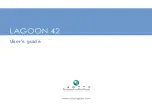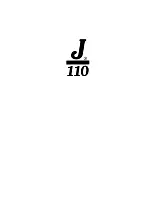
Bilge Plugs
Exhaust Flush Cap (Garden Hose Connector Cap)
Battery
Fuel Tank
Engine Compartment
Engine Oil Level
Engine Coolant
Check Carburetor
Check Fuel Water Separator Bottle
Clean Engine Breathing Oil Retainer
Jet Pump Water Intake
19
Periodically drain water or contaminated fuel from the separator bottle. Use a cup to collect the
drained liquids. To drain the contaminated fuel in the separator bottle, simply pull off the hose from
the middle nozzle of the bottle, and let the contaminated fuel drain out from the bottom nozzle
through the hose to a cup. Ensure reconnect the drain hose back to the middle nozzle of the
Check the bottle periodically and clean any oil residue to keep engine breathing freely. To drain the
oil/water in the retainer bottle, simply pull off the hose from the middle nozzle of the bottle, and let
the water/oil drain out from the bottom nozzle through the hose to a cup. Ensure reconnect the drain
hose back the middle nozzle of the oil retainer bottle.
Check the seal between the jet pump intake and the ride plate. A damaged seal will let air get into the
jet pump. The jet looses its propulsion force.
Although the jet pump is equipped with weed cutter. It is still recommended that check jet pump.
Remove weeds, shells, debris or anything else that could restrict the flow of water and damage
cooling system or propulsion unit. Clean as necessary. If any obstruction can not be removed, refer
to an authorized Aquanami dealer for servicing.
Inspect leading edges of the impeller, if they have nicks or bends performance will be greatly
reduced.
Do not inspect the water intake or intake grate without removing the lanyard from the post.
Check if any water exists. Check if any signs of water leak. Check fuel line connections for tightness.
Verify for any fuel leak/odor as well as oil and coolant leaks. Check any loosen parts.
Ensure oil level is appropriate as specified in LIQUIDS section. Check for oil leaks on engine and in
engine compartment.
Ensure coolant tank is full as specified in LIQUIDS section. Check for coolant leaks on engine, in
bilge and from ride plate.
Water or contaminated fuel in carburetor bowl will cause engine suddenly stop when you depress
throttle lever, or you may not be able to start engine. Periodically drain water or contaminated fuel
from the carburetor bowl by loosening the carburetor drain screw. Use a cup to collect the drained
liquids. Ensure the drain screw closed after cleaning.
Should water be present in the bilge, press manual bilge pump switch to start the electric bilge pump.
If some water remains in bilge, tilt the watercraft to the rear and unscrew drain plugs to completely
empty the bilge. Ensure all plugs securely closed before operating your Powerboard.
Ensure the exhaust flush cap (garden hose connector cap) is closed. Running the engine while
leaving the cap open will damage the exhaust system.
Pay attention to battery “+ and “-” signs. Ensure the battery is correctly connected, tighten and
secured.
With the watercraft horizontal, fill the fuel tank. Refer to Liquids section for checking fuel level and
fueling.
•Always close the exhaust flush cap (garden hose connector cap) after flushing the exhaust system.
•Running the engine with the cap open will damage the exhaust system.
•The battery must always be fully charged and in good condition. Loss of battery power may leave
you stranded. Never operate the watercraft if the battery does not have sufficient power or if it shows
any other signs of decreased power.
•Always remove safety lanyard from its post when engine is not running. Leave safety lanyayd on its
post will drain battery dead when engine is not running.
WARNING
WARNING
WARNING
!
!
!













































